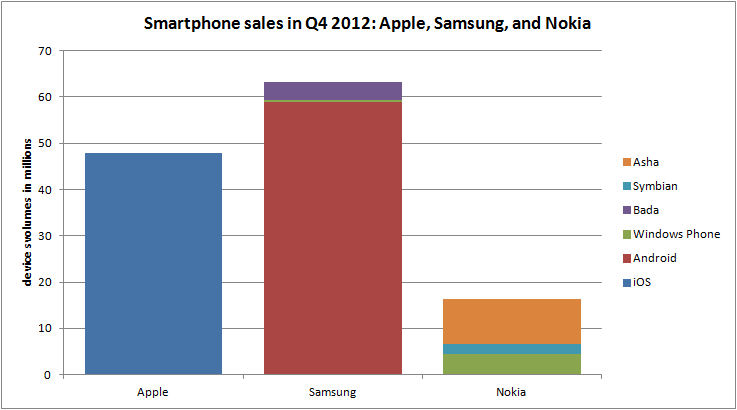This disparity in smartphone volumes underlines the mountain Microsoft, Nokia, and other Windows Phone handset manufacturers must scale if Windows Phone is to become established as "the third ecosystem". For a company that led the smartphone industry a handful of years ago, it also reiterates Nokia's new position as a challenger, rather than a leader.

Apple posted record profit of $13.1 billion on revenue of $54.5 billion for Q4 2012, but left some investors disappointed due to a poorer than expected holiday sales and a weak outlook for 2013. As a result the share price dropped by 12%, wiping roughly $50 billion off the company's value (nearly four times the market capitalisation of Nokia). Similarly Samsung reported recorded profits of $8.27 billion on revenue of $52.4 billion, with more than half the profits coming from the mobile devices business. However, the company expressed caution in its 2013 outlook saying that it expects sales to fall in the first quarter due to seasonality and increasing competition, noting that "the furious growth spurt seen in the global smartphone market last year is expected to be pacified by intensifying price competition compounded by a slew of new products".
Apple and Samsung will continue to be each others main competitors, but they will also increasingly face pressure from other smartphone manufacturers. Windows Phone, in the form of Nokia and HTC, will only be a minor portion of this. More significant will be the continued rise of Chinese manufacturers, such as Lenovo, ZTE, Huawei and TCL, especially in their home market. These companies will primairly produce smartphones based on Android, but it is possible than Windows Phone based devices could become more significant in the second half of the year.
Despite this increased competition, Apple and Samsung will remain the dominant players in the smartphone industry throughout 2013. However, it now seems certain the market will be more dynamic, with new entrants into the top five (Lenovo, ZTE, Huawei), new platforms (Firefox OS, Ubuntu, Jolla, Tizen), and a greater amount of uncertainity, than in 2012.
